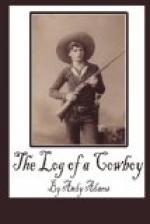“I was at a dance once in Live Oak County, and there was a stuttering fellow there by the name of Lem Todhunter. The girls, it seems, didn’t care to dance with him, and pretended they couldn’t understand him. He had asked every girl at the party, and received the same answer from each—they couldn’t understand him. ’W-w-w-ell, g-g-g-go to hell, then. C-c-c-can y-y-you understand that?’ he said to the last girl, and her brother threatened to mangle him horribly if he didn’t apologize, to which he finally agreed. He went back into the house and said to the girl, ’Y-y-you n-n-n-needn’t g-g-g-go to hell; y-y-your b-b-b-brother and I have m-m-made other ‘r-r-r-rangements.’”
CHAPTER III
THE START
On the morning of April 1, 1882, our Circle Dot herd started on its long tramp to the Blackfoot Agency in Montana. With six men on each side, and the herd strung out for three quarters of a mile, it could only be compared to some mythical serpent or Chinese dragon, as it moved forward on its sinuous, snail-like course. Two riders, known as point men, rode out and well back from the lead cattle, and by riding forward and closing in as occasion required, directed the course of the herd. The main body of the herd trailed along behind the leaders like an army in loose marching order, guarded by outriders, known as swing men, who rode well out from the advancing column, warding off range cattle and seeing that none of the herd wandered away or dropped out. There was no driving to do; the cattle moved of their own free will as in ordinary travel. Flood seldom gave orders; but, as a number of us had never worked on the trail before, at breakfast on the morning of our start he gave in substance these general directions:—
“Boys, the secret of trailing cattle is never to let your herd know that they are under restraint. Let everything that is done be done voluntarily by the cattle. From the moment you let them off the bed ground in the morning until they are bedded at night, never let a cow take a step, except in the direction of its destination. In this manner you can loaf away the day, and cover from fifteen to twenty miles, and the herd in the mean time will enjoy all the freedom of an open range. Of course, it’s long, tiresome hours to the men; but the condition of the herd and saddle stock demands sacrifices on our part, if any have to be made. And I want to caution you younger boys about your horses; there is such a thing as having ten horses in your string, and at the same time being afoot. You are all well mounted, and on the condition of the remuda depends the success and safety of the herd. Accidents will happen to horses, but don’t let it be your fault; keep your saddle blankets dry and clean, for no better word can be spoken of a man than that he is careful of his horses. Ordinarily a man might get along with six or eight horses, but in such emergencies as we are liable to meet, we have not a horse to spare, and a man afoot is useless.”




